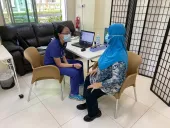
Industry leaders bare efforts to boost data management in healthcare
They emphasised that protecting patient data is still a shared responsibility.
The healthcare industry has taken on the painstaking effort to uphold the responsibility of data privacy protection, whilst bravely venturing into new technologies. After all, privacy is innately important in the medical field and one of the key issues discussed at the Healthcare Asia Summit 2024 in Singapore last 25 March.
But how do different players contribute to this vital endeavour?
Noel Pabilona, vice president and head, Facility Management and Engineering Group at St. Luke's Medical Center in the Philippines, said the hospital has invested in developing a system for electronic medical records.
Pabilona noted that in the Philippines, data is further protected by regulations in place and by making sure there is consent to share it.
Paul Chua, greater Asia cyber security officer at Becton Dickinson Medical Devices, said the company has worked with the Singapore government to enhance cybersecurity.
“They have the cybersecurity labelling scheme for medical devices. They want all manufacturers to go label our products to make sure that we maintain certain cybersecurity postures within our devices,” he said.
However, he warned that even the most secure products are at risk if not used in the right environment.
Chua emphasised the need to have a shared responsibility with healthcare delivery organisations to make sure their products are used in a very secure manner.
Importance of data sharing
To better provide services, the panellists also discussed the importance of data sharing.
In the insurance perspective, Susan Fanning, health insurance industry expert and health actuary, noted that data shared with service providers affects their pricing.
“The price is driven by utilisation, and utilisation is driven by use of hospital services, devices, drugs, all of the other aspects that are there. So we're just bringing all of that together with the data and information that's shared with us,” she explained.
Fanning also said there is more discussion going on about value-based care, which is dependent on outcomes people are getting.
Given this, she urged hospitals and providers to start sharing more of this information so that people can make more informed choices for their health.
“And that will then help go some way towards ensuring that insurance can stay affordable,” she added.
Meanwhile, Eugene Hong, executive director of the pharmaceuticals and healthcare division at DBS Bank, pointed out that data sharing in healthcare is very much restricted compared to the banking sector.
He shared that in Singapore, authorities and financial institutions developed the Singapore Financial Data Exchange. Through this system, individuals can easily access their information and use tools to make better decisions.
Hong admitted this can be difficult to implement in healthcare considering that in the insurance side alone, companies do not like sharing information due to competition.
“I think it can be overcome with industry participation or regulators pushing it. And there are other ways that insurers can be more competitive,” he pointed out.
Call for collaboration
Whilst there are several initiatives being implemented, a collaborative move is still a better approach towards achieving better data management in the healthcare ecosystem.
“What’s really important is the collaboration across the healthcare ecosystem; because we all serve the same people at the end of the day,” said Fanning.
Chua said regulators and the industry should also work together to boost integration of technologies like artificial intelligence.
Asked what could have changed in one year, Hong said this is a short time given that different countries have varying capabilities.
Still, he acknowledged that people are already talking about it and “seeds are already in motion.”













 Advertise
Advertise













